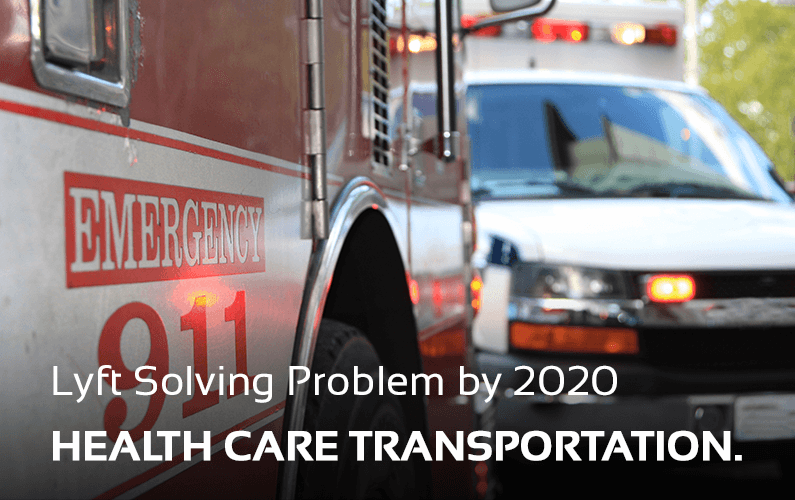Lyft Commits to Cutting the Problem of Healthcare Transportation in Half by 2020
Health transportation is an extremely important issue when it comes to accessing hospital services in the USA. Research shows that approximately 3.6 million Americans currently miss or delay medical care because they have no access to appropriate transportation. This is a common issue among the low-income Americans. They may lack enough money to pay for a working automobile or public transportation in case of medical emergencies.
This brief explains how Lyft is focused on dealing with the increased number of people who need access to the reliable and accessible transportation to medical services. It may be because of their age, chronic conditions, income, disability or any other constraint. Lyft is already saving money for health plans. They are focused at providing cheap and reliable transportation services to the people in the USA. LogistiCare has partnered with Lyft to bring access of healthcare transportation close to the patients. LogistiCare is a service for coordinating transportation to non-emergency medical appointments.
This partnership will ensure that LogistiCare will leverage Lyft’s application programming Interface and help users to access ride-sharing capabilities. This will be a very beneficial partnership which will bring healthcare transportation close to the residents of 31 states and the District of Columbia.
Lyft has also partnered up with Circulation to ensure the elderly and the poor have access to over 1000 healthcare facilities in the country. Circulation allows hospitals to schedule a on-time or recurring non-emergency transportation for their patients. This was a milestone on helping the elderly and the disabled patients around the country. It is a very good partnership to help patients request for services like: wheelchair assistance, helping to get into or out of the car and many more. If the relative or the care giver wants to accompany their loved ones to the hospital, then they can also request and be part of the process.
Lyft has also partnered with several other companies in their ambition to reduce healthcare inaccessibility by 50%. They previously partnered with CareMore Health system and American Medical Response among many others.
Lyft Partners with AllScripts to Leverage their Concierge API for Healthcare Transportation
Lyft partnering with AllScripts is a significant step in opening the ways to the health facilities. Up to 7.2 million patients will have an opportunity to request for a ride from Lyft directly from their platform using the Concierge API.
Lyft provides API access to all these partners and their platform in order to make it easy to facilitate this move. It also offers a B2B service to health facilities for them to schedule and call rides for their patients and clients. The Electronic Health Record (EHR) will make it possible to detect transportation needs from the electric files of patients. This will make it part of the ride-hailing workflow without additional work needed on the part of the health provider.
What This Means for the Problem of Healthcare Transportation
Lyft and their partners are focused to reducing the number of patients in America who have no reliable healthcare transportation. People will no longer miss out on crucial care and appointments because they simply have no access to the transportation. A previous research shows that missed appointments and lack of healthcare transportation in the US costs the health system an additional $150 million annually. The government has to incur an extra amount of money on providing transportation to the elderly, sick and disabled in the community. This is the reason why Lyft set a goal of cutting the number of American Citizens who don’t have access to healthcare transportation in half by 2020. This will help save lives and eventually a better living condition for Americans.
Improving healthcare is another advantage of this brilliant idea. Those people who did not previously have access to quality health services due to lack of transportation are now covered. Lyft is focused at reducing this number to 1.8 million from 3.6 million by 2020.
Reduce Healthcare Transportation Problem in Half, the Next Number to Hit is Zero.
If Lyft’s goals are met by 2020, the company will set a new target of reducing the number to zero thereafter. This will ensure that every American has reliable access to healthcare transportation. This will ensure no one will miss medical attention and appointments due to delays associated to lack of transportation to and from the hospital. This will help to reduce associated deaths and extra costs by the residents in case their conditions get worse if not attended earlier. The government will also have an easy time trying to get rural residents a way of getting to the hospitals.
With Lyft Concierge, the company allow an easy way for organizations to organize and schedule a ride for their patients even if they don’t have the app on their devices. This is a milestone in making healthcare transportation accessible from all corners of America. The fact remains that many Americans especially the low-income have either missed or rescheduled their appointments due to lack of enough money to get transportation services to the hospital. This will ensure that transportation should no more be a barrier for quality healthcare provision.
This move will help reduce waiting time and hence increase the quality of services provided by the hospitals. The partnerships will greatly reduce the time of accessing and attending to non-emergency medical appointments. Currently, many Americans are forced to cancel appointments and/or wait for a medical emergency just to reach the doctor. This idea seems logical in how it can be able to reduce the cases of missed medical attention. As a matter of fact, WHO postulates that the largest burden in the health sector is transportation especially among the low-income individuals in the world.
This idea by Lyft and the partners will greatly help the patients and the medical officers manage their schedules well. Most of the time a patient will innocently miss or reschedule a medical appointment simply because they have no access to healthcare transportation. The medical officer will have to waste time and resources organizing for a rescheduled medical appointments. This will mean a great loss to both of them. Lyft is here to ensure the Doctors and patients stay well organized. The patients will be able to attend their medical appointments in time and save time for the doctor to attend to other patients.
This idea will keep patients connected to their doctors. It will also help the doctor to follow up better with the patients. Lyft has partnered with AllScripts which keeps medical records to add an estimated number of 7 million patients through 2,500 hospitals and bring them near 180,000 physicians. The physicians can schedule a multiple ride at once using the custom desktop platform. This is one of the ways to follow up with the patients. If a doctor doesn’t follow up with the patient to ensure that they attend to all their appointments and medical attention, they can get penalized. ‘’ Obviously helping patients is a good thing, but there are financial ramifications of making sure your level of care is consistent. If you get penalized (for not following up with your patients), there’s incentives for you to track them better, and sometimes that means helping them get near you’’, Gartner analyst Tom Handler said.
The efforts of Lyft and the partners is to ensure that non-emergency medical transport is cost effective. Some of the low income Americans are not able to raise enough money to pay for reliable medical attention. This includes healthcare transportation. The ultimate goal of Lyft is to ensure every American will be able to afford healthcare transportation services. This will reduce instances of emergencies associated with missed medical attention or postponed medical attention.
This incentive is saving the insurers a great deal. The insurer is now spending less money on rides. They are also saving on time that they could otherwise have used to go picking the patients. Sachin Jain, the CEO and the president of CareMore says that they have been able to save $1 million since they partnered with Lyft. CareMore also reduced waiting time from 12.5 minutes to 8.8 minutes within a 3 month period in 2016.
Lyft has also established a very convenient way for the patients, caregivers, relatives, nurses and physicians to request for rides if need arise. Lyft built a web-based tool that they can use to schedule rides and track the patients in real time. Even if you don’t have a smartphone it doesn’t really matter because you can access all the services on the established platform using computers and other alternative devices.
Nobody will ever see the need of healthcare if you cannot be able to make the appointments especially if you are a house bound patient. Lyft is customizing its services to medical transportation to add scale to their services and at the same time helping health providers provide quality medical assistance to the patients. They are promising a lot in the Health sector in the USA. In the coming years, transport shouldn’t be a barrier to quality healthcare for the USA residents.



